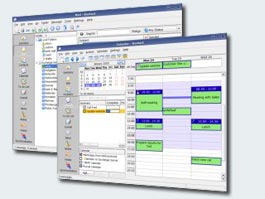Kontact
 |
O Kontact é o gerenciador de informações pessoais integrado do KDE. |
O pacote Kontact reúne os aplicativos maduros e testados do KDE PIM sob um mesmo teto. Graças à poderosa tecnologia do KPart, os aplicativos existentes estão perfeitamente integrados em um só.
Os componentes do KDE Kontact são desenhados para funcionar bem uns com os outros. Isso faz com que recursos como que seja intuitivo o arrastar e soltar entre compromissos, listas de tarefas e contatos. O KDE Kontact suporta vários servidores de groupware. Ao usar esses servidores o grupo tem acesso a recursos como pastas compartilhadas e-mail, listas de tarefas em grupo, compartilhamento de agenda, livros de endereços e agendamento de reuniões centralizados.
Em resumo: o KDE Kontact oferece inovações para ajudá-lo a gerenciar suas comunicações mais facilmente, organizar o seu trabalho mais rápido e colaborar mais estreitamente, resultando em mais produtividade e eficiência em colaboração digital.
Componentes
Estes programas podem ser integrados ao Kontact:
- Akregator - Leia suas fontes de notícias favoritas
- KAddressBook - Gerencie seus contatos
- KJots - Suas ideiais organizadas em um caderno
- KMail - Cliente de correio eletrônico
- KNode - Seu leitor de mensagens da usenet
- KNotes - Cole post-its em sua área de trabalho
- KOrganizer - Calendário, agenda e diário
- KTimeTracker - Monitore quanto tempo você gasta em diversas tarefas
- Summary - Tela com um resumo do Kontact
Veja também
- Como enviar um send SMS usando o Kontact
- Porte para dispositivos com telas sensíveis ao toque (como smartphones ou tablets) (atualmente para o maemo/Windows Mobile/MeeGo)
Onde obter ajuda
Há uma lista de correio em
- kdepim-users - para usuários dos aplicativos do KDE PIM (Kontact, KAddressBook, KMail, KOrganizer, KNode, ...) inscrição no kdepim-users arquivo do kdepim-users. Uma equipe de desenvolvedores e usuários que proporcionarão respostas o mais rápido possível
e para ajuda urgente, um canal IRC no Freenode
- para usuários e desenvolvedores do Kontact - #kontact
Akonadi and KAddressBook
If you have problems concerning Akonadi and the new KAddressBook, there are pages dedicated to these issues
FAQ, Hints and Tips
Migrating your setup to a new distro
In KMail, right click on your Inbox and choose Properties. Go the Maintenance Tab. Have a look at the Location. It has either .kde4 or .kde in the path.
Substitute the appropriate path below.
You need the following config files:
- .kde4/share/config/emaildefaults
- .kde4/share/config/emailidentities
- .kde4/share/config/kmail.eventsrc
- .kde4/share/config/kmailrc
- .kde4/share/config/kaddressbookrc
- .kde4/share/config/kresources/contact
- .kde4/share/config/korgacrc
- .kde4/share/config/korganizerrc
- .kde4/share/config/knotesrc
- .kde4/share/config/mailtransports
And the following directories:
- .kde4/share/apps/kmail
- .kde4/share/apps/kabc
- .kde4/share/apps/korganizer
- .kde4/share/apps/knotes
If you use Akregator within Kontact, you will also need:
- .kde4/share/config/akregator.eventsrc
- .kde4/share/config/akregatorrc
And the whole .kde4/share/apps/akregator directory.
Of course the simplest way is just to keep your whole home directory.
Just a word of warning. If the directory naming is different between Desktops or between the two versions of your distro, this will not work as there are references to the directories within the config files. This means that if the files were in a .kde directory, you cannot just put them in a .kde4 directory without editing the references within the config files.
Hiding the Kontact Sidebar
On small screens, you may wish to reclaim the space used by the Kontact sidebar. You can replace it with an (editable) toolbar:
- Drag the left panel closed using the splitter between it and the main panel, job done.
Enabling SOCKS support in KMail and KNode
Unlike KDE 3, KDE 4 does not have built-in SOCKS support yet. However, it is still possible and relatively simple to make KMail and KNode use a SOCKS proxy, by using proxychains or other similar tools like tsocks or socksify. Assuming that proxychains is correctly installed and configured, all you need to do is to open a terminal (e.g. Konsole) and type:
proxychains kdeinit4
You don't even need to restart KMail/KNode! (You need to type the above command every time you start a new KDE session though).
